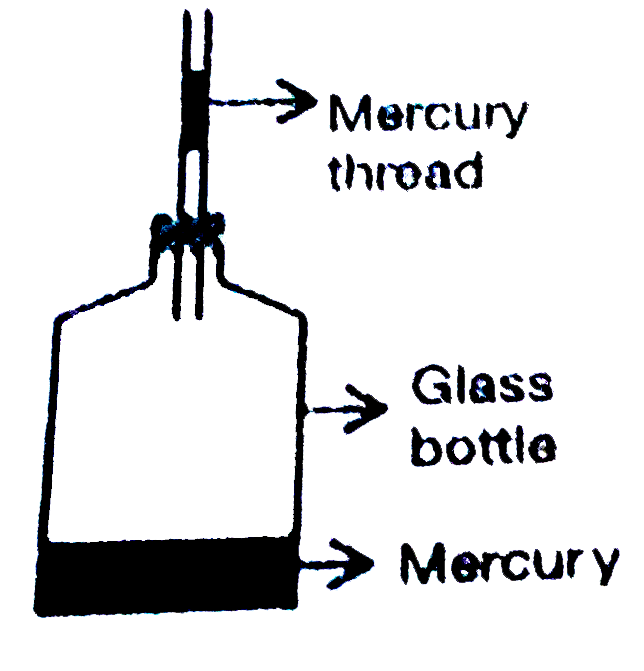A bakelite beacker has volume capacity of 500ccat30∘C. When it is partially filled with Vm volumne (at 30∘C) of mercury, it is found that the unfilled volume of the beaker remains constant as temperature is varied. If γbeaker=6×10−6.∘C−1 and γmercury=1.5×10−4.∘C−1 , where γ is the coefficient of volume expansion , then Vm (in cc) is close to __________.
The correct Answer is:20
To solve the problem, we need to understand the relationship between the volume expansion of the beaker and the mercury as the temperature changes.
1. Understanding Volume Expansion:
The volume expansion of a substance can be expressed using the formula:
ΔV=V0⋅γ⋅ΔT
where ΔV is the change in volume, V0 is the initial volume, γ is the coefficient of volume expansion, and ΔT is the change in temperature.
2. Initial Conditions:
The beaker has a total volume of Vbeaker=500cc at 30∘C. Let the volume of mercury be Vm at 30∘C.
3. Volume Expansion of the Beaker:
As the temperature changes, the volume of the beaker will expand. The change in volume of the beaker when the temperature changes by ΔT is:
ΔVbeaker=500⋅(6×10−6)⋅ΔT
4. Volume Expansion of Mercury:
The volume of mercury will also expand as the temperature changes. The change in volume of the mercury is:
ΔVmercury=Vm⋅(1.5×10−4)⋅ΔT
5. Condition for Constant Unfilled Volume:
The problem states that the unfilled volume of the beaker remains constant as temperature varies. This means that the expansion of the mercury must equal the expansion of the beaker:
ΔVmercury=ΔVbeaker
Substituting the expressions we derived:
Vm⋅(1.5×10−4)⋅ΔT=500⋅(6×10−6)⋅ΔT
6. Cancelling ΔT:
Since ΔT is common on both sides and is not zero, we can cancel it out:
Vm⋅(1.5×10−4)=500⋅(6×10−6)
7. Solving for Vm:
Now we can solve for Vm:
Vm=500⋅(6×10−6)1.5×10−4
Vm=500⋅61.5⋅10−610−4=30001.5⋅10−2
Vm=2000⋅10−2=20cc
Thus, the volume of mercury Vm is approximately 20 cc.
The volume expansion of a substance can be expressed using the formula:
ΔV=V0⋅γ⋅ΔT
where ΔV is the change in volume, V0 is the initial volume, γ is the coefficient of volume expansion, and ΔT is the change in temperature.
The beaker has a total volume of Vbeaker=500cc at 30∘C. Let the volume of mercury be Vm at 30∘C.
As the temperature changes, the volume of the beaker will expand. The change in volume of the beaker when the temperature changes by ΔT is:
ΔVbeaker=500⋅(6×10−6)⋅ΔT
The volume of mercury will also expand as the temperature changes. The change in volume of the mercury is:
ΔVmercury=Vm⋅(1.5×10−4)⋅ΔT
The problem states that the unfilled volume of the beaker remains constant as temperature varies. This means that the expansion of the mercury must equal the expansion of the beaker:
ΔVmercury=ΔVbeaker
Substituting the expressions we derived:
Vm⋅(1.5×10−4)⋅ΔT=500⋅(6×10−6)⋅ΔT
Since ΔT is common on both sides and is not zero, we can cancel it out:
Vm⋅(1.5×10−4)=500⋅(6×10−6)
Now we can solve for Vm:
Vm=500⋅(6×10−6)1.5×10−4
Vm=500⋅61.5⋅10−610−4=30001.5⋅10−2
Vm=2000⋅10−2=20cc
Topper's Solved these Questions
Similar Questions
Small amount of mercury is poured in a glass container of 2 litres capacity. Calculate the volume of mercury in the container assuming that volume of air inside the container always remains same.
α for glass =9×10−6∘C−1
α for mercury =0.6×10−4∘C−1
View SolutionA gasoline tank made of steel is filled completely with 60 litres of gasoline, both at a temperature of 12∘C . How much gasoline will overflow when the temperature is increased to 25∘C ?
αsteel=1.1×10−5∘C−1
γgasoline=9.5×10−4∘C−1
View Solution
Knowledge Check
The fraction of the volume of a glass flask must be filled with mercury so that the volume of the empty space may be the same at all temperature is
(αglass=9×10−6/0C,γHg=18.9×10−5/0C)A12B17C14D15A glass flask of volume 200cm3 is just filled with mercury at 20∘C. The amount of mercury that will overflow when the temperature of the system is raised to 100∘C is (γglass=1.2×10−5/C∘,γmercury=1.8×10−4/C∘)
A2.15 cm3B2.69 cm3C2.52 cm3D2.25 cm3A two litre glass flask contains some mercury. It is found that at all temperatures the volume of the air inside the flask remains the same. The volume of the mercury inside the flask is (αfor glass =9×10−6/∘C,γ for mercury 1.8×10−4/∘C)
A1500 ccB150 ccC3000 ccD300 cc
A glass beaker holds exactly 1Lat0∘C
(a) What is its volume at 50∘C ?
(b) If the beaker is filled with mercury at 0∘C, what volume of mercury overflows ehen the temperature is 50∘C ? αg=8.3×10−6per∘C andγHg=1.82×10−4per∘C.
View SolutionA flask of one liter volume contains some mercury . It is found that volume of air inside , the flask remains constant at all temperatures .If 'a' of glass is 9×10−6 SI units ,coefficient of real expansion of mercury is 180×10−6 SI units volume of mercury in the flask is
View SolutionA constant volume air thermometer is as shown in the figure below. Explain why the bottle is partly filled with mercury. Find the ratio fo volume of mercury present in the bottle to the volume of the bottle if the volume coefficients of mercury and glass are 1.8×10−4K−1and6×10−5K−1, respectively.

View SolutionA one litre flask contains some mercury. It is found that at different temperatures the volume of air inside the flask remains the same. The volume of mercury in the flask is (αglass=9×10−6/∘C,γHg=180×10−6/∘C)
View SolutionDriver of a truck gets his steel petrol tank filled with 75L of petrol at 10∘C. If a αsteel is 12×10−6/.∘C and γpet is 9.5×10−4/.∘C the overflow of petrol at 302C is -
View Solution
